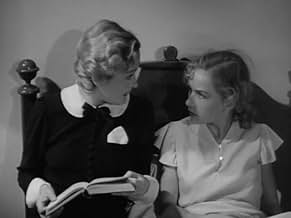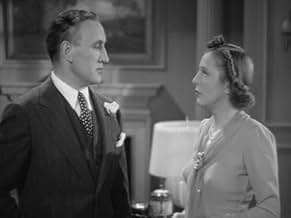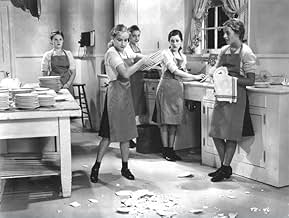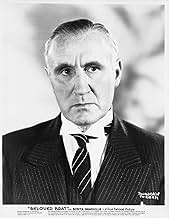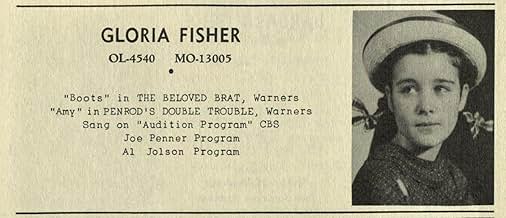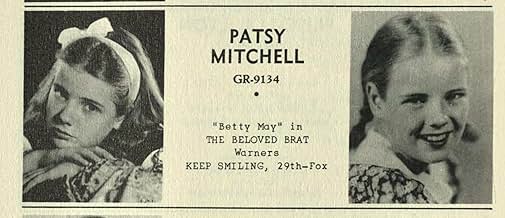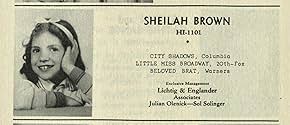अपनी भाषा में प्लॉट जोड़ेंDrama about a problem child and her problem parents.Drama about a problem child and her problem parents.Drama about a problem child and her problem parents.
- निर्देशक
- लेखक
- स्टार
Lucile Gleason
- Miss Brewster
- (as Lucille Gleason)
Matthew 'Stymie' Beard
- Pinkie White
- (as Stymie Beard)
Gloria Fisher
- Boots
- (as Gloria Fischer)
Jessie Arnold
- Nurse
- (बिना क्रेडिट के)
Mary Avery
- Teacher
- (बिना क्रेडिट के)
फ़ीचर्ड समीक्षाएं
Bonita Granville, prior too 1938 plied her trade primarily at RKO with stints at other studios, like Paramount. For the most part her roles were of a obnoxious BRAT and not a very sympathetic character. Sometimes mildly irritating, like in CALVACADE (1933) FOX, often a real pain in the ass as in THESE THREE (1936) RKO or MAID OF SALEM (1937) PARAMOUNT. In late 1937 she was contracted by Warner Brothers (WB) and her career took a decisive turn.
THE BELOVED BRAT (1938) WB, clearly showed this change of pace. Bonita played a young Girl who is ignored by her business obsessed Father and a Mother more interested in 'bridge clubs' and local social exercises then her parental obligations. The first is somewhat excusable, the latter not at all. Though fifth-teen (15) at the time Bonita plays her character younger then her years, but gets it across very well. Her tribulations take her from confused and defiant adolescent to responsible young person. Ending with love and understanding for all.
Ms. Granville is supported by a competent script and cast. It was refreshing to see Black-Americans portrayed as Friends and not simple minded lackey's. At the WB and other studios they were often portrayed in a stereotypical way, particularly in the films of Bette Davis. She also has the advantage of Donald Crisp (was he ever young?) as her Father. I have never seen Mr. Crisp phone in a role, he is a professional every time. Silent Star, Doleros Costello, the former Mrs. John Barrymore (Drew's Grand-Mother) also delivers the goods. Still a delicate beauty and showing a effortless acting style.
Ms. Granville would work at the WB till the early 1940s' then moving on to MGM with occasional loan-outs. In all of her films she would bring her competent abilities and mature into a attractive actress. She knew when the 'gig' was up, married well (multi-million$ & oil) and became a Producer of LASSIE (T.V.)! This Women really had her head screwed on straight, dieing rather young at Sixty-Five (65).
THE BELOVED BRAT (1938) WB, clearly showed this change of pace. Bonita played a young Girl who is ignored by her business obsessed Father and a Mother more interested in 'bridge clubs' and local social exercises then her parental obligations. The first is somewhat excusable, the latter not at all. Though fifth-teen (15) at the time Bonita plays her character younger then her years, but gets it across very well. Her tribulations take her from confused and defiant adolescent to responsible young person. Ending with love and understanding for all.
Ms. Granville is supported by a competent script and cast. It was refreshing to see Black-Americans portrayed as Friends and not simple minded lackey's. At the WB and other studios they were often portrayed in a stereotypical way, particularly in the films of Bette Davis. She also has the advantage of Donald Crisp (was he ever young?) as her Father. I have never seen Mr. Crisp phone in a role, he is a professional every time. Silent Star, Doleros Costello, the former Mrs. John Barrymore (Drew's Grand-Mother) also delivers the goods. Still a delicate beauty and showing a effortless acting style.
Ms. Granville would work at the WB till the early 1940s' then moving on to MGM with occasional loan-outs. In all of her films she would bring her competent abilities and mature into a attractive actress. She knew when the 'gig' was up, married well (multi-million$ & oil) and became a Producer of LASSIE (T.V.)! This Women really had her head screwed on straight, dieing rather young at Sixty-Five (65).
Poor little rich girl Bonita Granville is lonely. It's her birthday but her parents are too busy even to have lunch with her. "I'm sorry, I can't make it," her father tells her casually. "Now, anything else you want for your birthday, just name it and it's yours."
Granville wanders off and makes a friend - a kid named Pinky who has a pop gun and likes to go fishing. But when Granville invites Pinky over to her house, the butler calls him a ragamuffin and throws him out. Now Bonita is mad and you can hardly blame her. One thing leads to another and soon she has set her bedroom on fire, helped to cause a car accident, and been sent to a girls' school to reform.
It's sappy and predictable but this family drama is still hard to resist. Bonita Granville pours on the wild mood swings pretty heavily, but in spite of the overblown emotions she remains charismatic and even charming. She makes us cringe a couple of times but we are certainly happy to root for her.
Donald Crisp and Natalie Moorhead give competent but thankless performances as the clueless parents. Dolores Costello is fine as the lead teacher at the school who urges patience with Granville; she strikes up a friendship with Donald Briggs, the one adult whom Granville seems to trust. A young Leo Gorcey appears in one scene and pushes Bonita into a river.
Overall, Bonita Granville is pretty much the whole show. It's a ridiculously corny plot but, surprisingly, it works.
Granville wanders off and makes a friend - a kid named Pinky who has a pop gun and likes to go fishing. But when Granville invites Pinky over to her house, the butler calls him a ragamuffin and throws him out. Now Bonita is mad and you can hardly blame her. One thing leads to another and soon she has set her bedroom on fire, helped to cause a car accident, and been sent to a girls' school to reform.
It's sappy and predictable but this family drama is still hard to resist. Bonita Granville pours on the wild mood swings pretty heavily, but in spite of the overblown emotions she remains charismatic and even charming. She makes us cringe a couple of times but we are certainly happy to root for her.
Donald Crisp and Natalie Moorhead give competent but thankless performances as the clueless parents. Dolores Costello is fine as the lead teacher at the school who urges patience with Granville; she strikes up a friendship with Donald Briggs, the one adult whom Granville seems to trust. A young Leo Gorcey appears in one scene and pushes Bonita into a river.
Overall, Bonita Granville is pretty much the whole show. It's a ridiculously corny plot but, surprisingly, it works.
Roberta Morgan (Bonita Granville) has wealthy parents who don't care much about her. She is forced to give up a puppy for embarrassing her mother. She acts out against the household help. She befriends black siblings, Pinkie White and his sister Arabella. She is impressed with their loving family. She acts out more when Jenkins the butler kicks out her guest Pinkie.
I don't know the old time definition of brat. She's not really bratty in the modern sense for the first half hour. She's more a poor little rich girl. Of course, the fire is very bratty and the perjury is unforgiveable. In the end, Roberta is a conflicted character. The turns are abrupt. I would have preferred a simply runaway story and Pinkie can help her return home. The story leaves me a little unsatisfied. Leo Gorcey does have a good scene looking like his Dead End Kid. Granville is a fine young sassy actress. So I like the first half but the second half is not as compelling.
I don't know the old time definition of brat. She's not really bratty in the modern sense for the first half hour. She's more a poor little rich girl. Of course, the fire is very bratty and the perjury is unforgiveable. In the end, Roberta is a conflicted character. The turns are abrupt. I would have preferred a simply runaway story and Pinkie can help her return home. The story leaves me a little unsatisfied. Leo Gorcey does have a good scene looking like his Dead End Kid. Granville is a fine young sassy actress. So I like the first half but the second half is not as compelling.
This film is unexpectedly relevant to what is happening today, 70 years later, as the Western world is being flooded with spoilt 'Frankenkinder' and China is being flooded with even more spoilt 'little emperors'. This is a very gritty tale written by the Romanian refugee Jean Negulesco, before he had begun to direct films. Negulesco did not write the script, and I suspect that was softened, and the ending made more sentimental than in his original story, in order to be more 'audience friendly'. Bonita Granville, a highly talented young actress of the time (best known for her four Nancy Drew mystery films, in which she excelled when she was somewhat older), plays the neglected daughter of a truly appalling spoilt rich couple. The mother is the worst sort, many of whom I have had the misfortune to know and who are more common than ever today; her interest is herself, and a child is at best an accessory and at worst a nuisance to be disposed of to servants and then to a boarding school. In her case, however, she did not even have the excuse of being a 'killer career woman', but was merely an idle and vain social snob. The father is only interested in making money, and is always out doing so. This leaves the normally charming Bonita, who has a great deal of fire to her character, to rebel and become in protest a hideously spoilt brat, and eventually even a delinquent entangled in a crime. This process is clearly shown, to a degree not at all normal in Hollywood films, where false sentimentality was the usual way to view children. Bonita Granville rises to the challenge extremely well, not hesitating to make herself as odious as necessary. There is a very wicked butler who torments the girl secretly, there is a very nice male secretary who tries to help her, and eventually an angelic school headmistress who wishes to save her. The film is really a very savage attack on the idle rich and their family victims. Negulesco, who had been a 'companion to rich older women' at Nice before coming to Hollywood, was clearly describing a woman of precisely the type he had known personally, with a rich absent husband and a victimized daughter such as he must have observed at first hand. It is a bitter tale, and honestly done except for the ending.
Warner Bros. was known for gritty gangster pictures. Here, of all things, they've fashioned a gritty adolescent girl film, with a lot more boldness than I ever expected. More than a brat, Roberta's a little hellion, flinging food trays and emotional tizzies at the slightest provocation. We understand her problems come from an unloving wealthy household where she and the butler (Vogan) go ten-rounds without a referee.
But consider the darker side. She is, after all, partially responsible for the death of an innocent motorist, when she grabs the car wheel from butler Jenkins. The probation school reckoning for that strikes me as pretty mild. Nor, rather surprisingly, does the screenplay supply a moral reckoning. Also unexpected is the casualness with which Roberta crosses the colorline with Pinkie (Beard) and his Negro family. But then, she probably identifies more with them than with her distant mother and father. And I agree with another reviewer that there seems some innuendo from the handsome Williams toward the budding young woman.
All of this strikes me as unusual for a Production Code programmer. But then writer Negulesco directed some of the better studio products of the 40's and 50's, including the soulful Deep Valley (1947) and the surprisingly sensitive Take Care of My Little Girl (1952). Then too, Granville turns in an absolutely bravura performance that rivets attention throughout. Quite a risk for a young actress to make herself so unlikable for so much of the movie. Anyhow, the last third lapses into something much more conventional, as might be expected for what remains a commercial product. Nonetheless, there's enough of the unconventional in both filming and writing to make this little obscurity worth catching up with.
But consider the darker side. She is, after all, partially responsible for the death of an innocent motorist, when she grabs the car wheel from butler Jenkins. The probation school reckoning for that strikes me as pretty mild. Nor, rather surprisingly, does the screenplay supply a moral reckoning. Also unexpected is the casualness with which Roberta crosses the colorline with Pinkie (Beard) and his Negro family. But then, she probably identifies more with them than with her distant mother and father. And I agree with another reviewer that there seems some innuendo from the handsome Williams toward the budding young woman.
All of this strikes me as unusual for a Production Code programmer. But then writer Negulesco directed some of the better studio products of the 40's and 50's, including the soulful Deep Valley (1947) and the surprisingly sensitive Take Care of My Little Girl (1952). Then too, Granville turns in an absolutely bravura performance that rivets attention throughout. Quite a risk for a young actress to make herself so unlikable for so much of the movie. Anyhow, the last third lapses into something much more conventional, as might be expected for what remains a commercial product. Nonetheless, there's enough of the unconventional in both filming and writing to make this little obscurity worth catching up with.
क्या आपको पता है
- ट्रिवियाThe $50 Roberta receives from her father as a birthday present would equate to over $900 in 2019.
- गूफ़In two consecutive scenes between Donald Briggs and Dolores Costello, one interior and then exterior, first the shadow of the mike and then the mike and boom can be seen.
- कनेक्शनFeatured in Jack Wrather: A Legacy of Film and Friendship (2022)
टॉप पसंद
रेटिंग देने के लिए साइन-इन करें और वैयक्तिकृत सुझावों के लिए वॉचलिस्ट करें
विवरण
- रिलीज़ की तारीख़
- कंट्री ऑफ़ ओरिजिन
- भाषाएं
- इस रूप में भी जाना जाता है
- Girls on Probation
- फ़िल्माने की जगहें
- उत्पादन कंपनियां
- IMDbPro पर और कंपनी क्रेडिट देखें
- चलने की अवधि
- 1 घं 2 मि(62 min)
- रंग
- ध्वनि मिश्रण
- पक्ष अनुपात
- 1.37 : 1
इस पेज में योगदान दें
किसी बदलाव का सुझाव दें या अनुपलब्ध कॉन्टेंट जोड़ें

